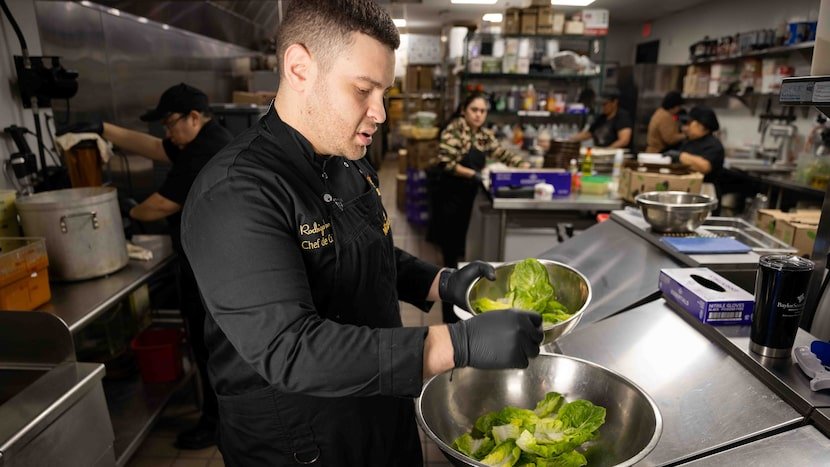Baja-style cuisine is one of the most innovative in Mexico. It mixes the flavors of traditional Mexican food with products from sea and land, which are abundant in the region.
The name Baja-style cuisine comes from the state where the region is located: Baja California, in the northwest corner of the country. It neighbors California and is one of the most active border regions in the world.
It is a land of migrants whose cuisine has been enriched by different cultures, creating a fusion of flavors that has conquered the palates not only of Mexico, but of people from all over the world. But it is difficult to find in Texas.
One of those migrants who arrived in Tijuana was Rodrigo Lomelí, now chef de cuisine at The Mexican, who lived for a few months in that city. That time was enough to inspire him to create dishes that he now serves at The Mexican, one of the most exclusive upscale Mexican food restaurants in Dallas.
Those dishes are the Mexican Rosarito Taco and Ancho Chile Caesar Salad, both created by Lomelí with Baja inspiration.
Inspiration from the sea
Originally from Guadalajara and raised in Monterrey, Lomelí began his culinary journey in restaurants in that city. Years later, his career took him to Tijuana, San Diego’s neighbor and known as one of Mexico’s most important culinary centers.
Those months were enough for him to create a memorable taco.
“One day, walking along the beach, I found one of those guys who sell fried fish, and I ate one with mayonnaise, like a fish banderilla, and it had an unbeatable flavor,” Lomelí says.
Baja-style cuisine uses many seafood products, and one of the most traditional is lobster prepared in the style of Puerto Nuevo, a community located south of Tijuana and neighboring Rosarito, which gives its name to Lomelí’s taco.
Puerto Nuevo-style lobster is cooked in salt and spices and served with beans, rice and flour tortillas to make tacos that are bathed in liquid butter.

“In Baja California, because it’s surrounded by sea, a lot of people eat lobster, and they do everything in a taco or burrito,” Lomelí says. “They take great care of the texture of the lobster. They don’t overcook it; they cook it for about 5 minutes so the texture is crunchy, semi-raw, because they say the flavor of the lobster tastes better that way.”
The Mexican Rosarito is a flour tortilla taco with lobster prepared in the pan with butter and garlic and flamed with tequila. Rice, beans and other add-ins like dressings and sauces are added later.
“This taco is ours, but Baja California inspires it,” Lomelí says.
A dish with history
Lomelí also created his own version of Caesar salad, Baja California’s most iconic salad and one that has become popular worldwide.
“Everyone makes a Caesar salad like the one from Tijuana, but not us. We make a salad based on the one from Tijuana, but elevated,” Lomelí says.
The Caesar salad was created in 1924 at Caesar’s, located in the hotel of the same name in Tijuana. It was the era of alcohol prohibition, and the city, on the border of Mexico and the United States, offered unlimited drinks to Americans looking for ways to have fun.
Originally, the salad was made with romaine lettuce, croutons, Parmesan cheese and a dressing with anchovies, olive oil, lime, dijon mustard, garlic and other ingredients.

In his version of the dish, Lomelí tries to adapt it to the taste of his American diners but always keeps a surprise factor: the Ancho chile.
“We added more ingredients and omitted ingredients. It is a new recipe; we put it on another level,” Lomeli says. “We put in other stronger ingredients, but it’s a totally different recipe inspired by the Caesar salad.”
One thing Lomelí likes is that Caesar salad can be a sharing dish, something he also appreciates about the Baja region.
“Honestly, I never ate as a family,” Lomelí says. “And back in Baja California, I was invited many times to eat at home, and everyone eats as a family, everyone talks, everyone shares the food, and it is enough for everyone. And I loved that.”

This story is part of D-FW Sabores, a new series dedicated to finding authentic Mexican cuisine across North Texas, dish by dish, region by region.











